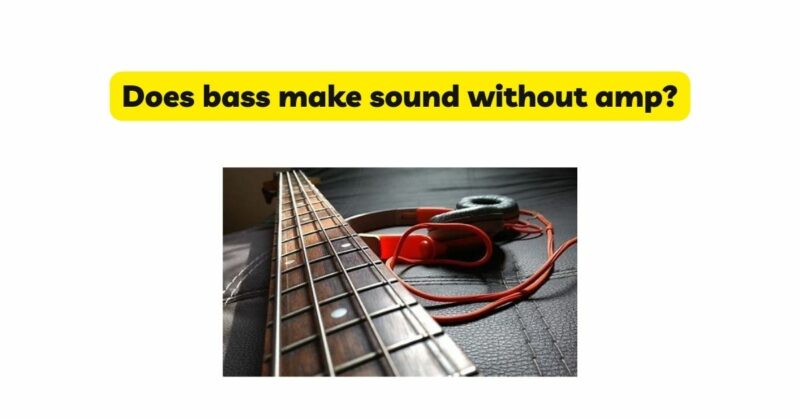The bass guitar, renowned for its low-pitched and rumbling tones, is an essential component of many musical genres. It plays a pivotal role in providing the foundation and rhythm in a band. Typically, bass guitars are connected to amplifiers to produce the necessary volume and enhance the sonic qualities of the instrument. However, a common question that arises among enthusiasts and newcomers alike is whether a bass guitar can produce sound without an amplifier. In this article, we will delve into the intricacies of the bass guitar’s sound production and explore the circumstances in which it can be heard without the aid of an amplifier.
- The Acoustic Nature of the Bass Guitar: To understand whether a bass guitar can make sound without an amplifier, it is crucial to grasp the instrument’s acoustic properties. In its simplest form, a bass guitar consists of a solid body or hollow chamber, a neck, frets, and strings. When the player plucks the strings, they vibrate, transmitting energy to the body of the instrument. This energy generates sound waves that propagate through the air, allowing the human ear to perceive them as sound.
However, compared to acoustic guitars or other stringed instruments, the bass guitar’s sound production is relatively weak when played without amplification. The fundamental frequency of the bass guitar’s strings is significantly lower than that of higher-pitched instruments, making it more challenging for the sound waves to resonate effectively.
- Audibility of Unamplified Bass Guitar : While it is technically possible to hear an unamplified bass guitar, several factors influence its audibility. The volume of the instrument depends on various elements, including the type of bass guitar, playing technique, string material, and room acoustics.
2.1 Type of Bass Guitar: Different bass guitars have distinct acoustic properties. Electric bass guitars, designed to be played with amplification, have smaller bodies and solid construction, which limit their ability to generate significant volume acoustically. On the other hand, acoustic bass guitars, larger in size with hollow bodies, are specifically designed for unamplified performances, producing a more audible sound.
2.2 Playing Technique: The way a bass guitarist plays significantly affects the audibility of their instrument. Techniques like fingerstyle or slap bass produce more volume compared to playing with a pick. Skilled bassists can maximize the projection of sound by adjusting their playing technique to suit unamplified settings.
2.3 String Material: The choice of strings also impacts the audibility of an unamplified bass guitar. Some string materials, such as nickel-plated steel or flatwound strings, tend to produce more pronounced acoustic sound due to their inherent characteristics. This can help enhance the audibility of the bass guitar when played without amplification.
2.4 Room Acoustics: The environment in which the bass guitar is played plays a crucial role in its audibility. In a small and acoustically lively space, the sound waves generated by the bass guitar can bounce off the walls and resonate, resulting in a more audible sound. Conversely, in larger or more absorptive rooms, the sound can disperse quickly, making the instrument less perceptible.
- Limitations and Recommendations: While it is possible to hear a bass guitar without an amplifier, it is important to acknowledge the limitations and consider alternative solutions to optimize its audibility.
3.1 Enhancing Acoustic Sound: To maximize the acoustic sound of a bass guitar, players can experiment with different playing techniques, such as adjusting their attack and plucking closer to the bridge. This can help generate more volume and clarity in unamplified situations. Additionally, selecting strings specifically designed for acoustic sound production can also contribute to enhancing the instrument’s audibility.
3.2 Portable Amplification: In scenarios where a bass guitar needs to be heard in larger or louder environments, portable amplification solutions can be employed. Battery-powered mini amplifiers or headphone amplifiers can provide a boost in volume without the need for a full-sized amplifier setup. These compact options can be convenient for practicing, busking, or small-scale performances.
3.3 Acoustic Bass Guitars: For players seeking a more pronounced acoustic sound, investing in an acoustic bass guitar is a viable option. These instruments are designed with larger bodies and optimized for unamplified performances. Acoustic bass guitars offer a fuller and more resonant sound, making them suitable for situations where amplification is not readily available or desired.
Conclusion : While a bass guitar can produce sound without an amplifier, its audibility is significantly diminished compared to when it is played through an amplifier. The low frequencies and the inherent construction of the instrument present challenges in projecting sufficient volume in unamplified situations. However, with careful consideration of playing techniques, string selection, and room acoustics, the bass guitar’s acoustic sound can be enhanced. Additionally, portable amplification options and acoustic bass guitars offer alternative solutions for situations where greater audibility is required. Ultimately, the decision to use an amplifier or play unamplified depends on the specific context, desired sound, and the player’s preferences.


